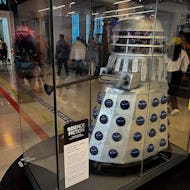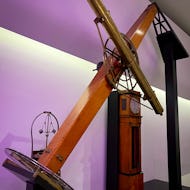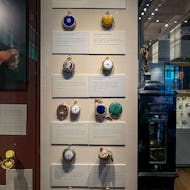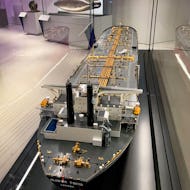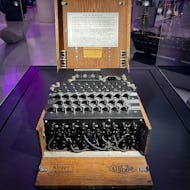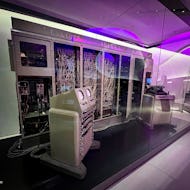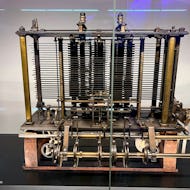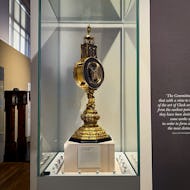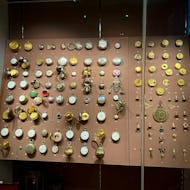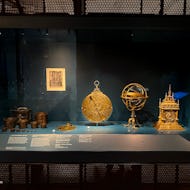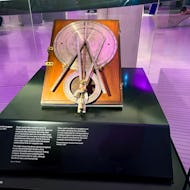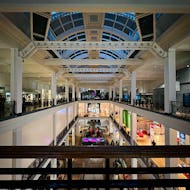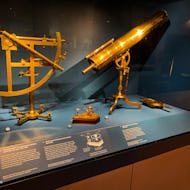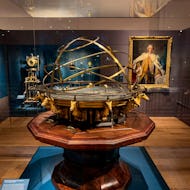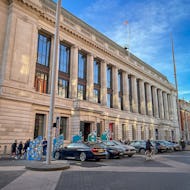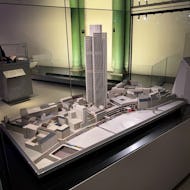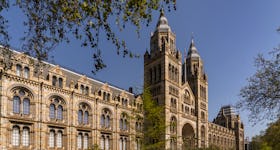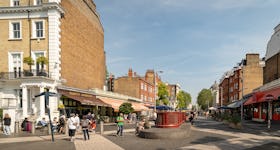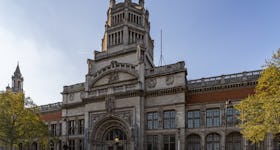The area has several famous museums, including the Natural History Museum and the Victoria & Albert Museum.
History
The Science Museum’s collection was initially part of the same collection as the Victoria & Albert Museum in the South Kensington Museum (established 1857). The science-related items were split into its own collection when the construction of the Science Museum started in 1914.
Building
The building on Exhibition Road was opened to the public between 1919 and 1928. It was extended several times, the latest being the Wellcome Wing in 2000. The museum has five floors, each hosting several galleries. There’s an open space in the centre of the building, from which you can see up or down the other floors. The museum has several food and drink options on the different floors.
The Collection and Galleries
The museum has numerous exciting ways of showcasing information about science. There are items to see, listen to, read about specific topics, or try one of the interactive displays. There is also an IMAX 3D theatre, particularly for space-related shows.
The Wonderlab is an interesting place for children between the ages of 7 and 14. Here, they can see and interact with different scientific phenomena.
Here’s a summary of the galleries and exhibitions on each floor.
Basement
- The Secret Life of Home - Evolution of Household Objects
- The Garden - Learn and Explorer through Play, ages 3-6
- Power Up - An interactive gallery where you can try games from the past 50 years using one of the 160 consoles available
Ground Floor
- Energy Hall - How steam machines affected British industry
- Exploring Space - Space exploration exhibits, read more below
- Making the Modern World - Iconic objects that changed our lives
- IMAX The Ronson Theatre - Different IMAX films
- Pattern Pod - Interactive area for children aged 3-8
- Exhibition: Injecting Hope - Developing vaccines
First Floor
- Engineers - Iconic engineering innovations
- Technicians - Interactive gallery with several exciting exhibits
- Medicine - History of medicine and health
- Who Am I? - Interactive gallery with hands-on exhibits
- Exhibition: Turn it Up - How and why music shapes our lives?
Second Floor
- The Clockmakers’ Museum - Unique watch collection from 1600 - present
- Science City 1550 - 1800 - Scientific history of London
- Mathematics - How mathematics connects to our lives
- Information Age - History of information and communication technology
- Exhibition: Zimingzhong - Clockwork technology from China
- Energy Revolution - Sustainable energy
Third Floor
- Wonderlab - Interactive science gallery for 7-14 year olds
- Flight - Aviation History
Gallery: Exploring Space
The museum has a collection of items in the fields of science. One of the most fascinating fields is space and space-related items. In the Exploring Space gallery, you can see and learn about objects from rockets to satellites, and you can find a full-sized replica of the Eagle, which landed on the moon in 1969. With the moon lander, you can also see the descent module that carried astronauts from the ISS back to Earth in 2016. There is also a 4.6 billion-year-old sample from the asteroid Ryugu on display.
Visiting
Admission to the museum is free, but pre-booking is required. Some exhibitions require a ticket.
There is a lot to see in the museum, and you should reserve at least two hours, although spending the whole day there is easy. The museum has several places for coffee or food, making it convenient to take a break from exploring and recharging.
While in the area, if you still have energy, the Natural History Museum and Victoria & Albert Museum are very close, making it easy to visit all three on the same day.
